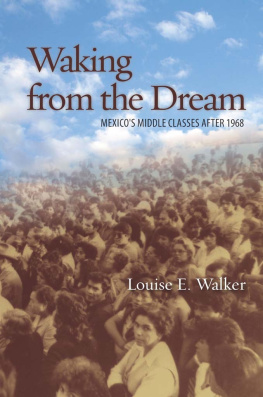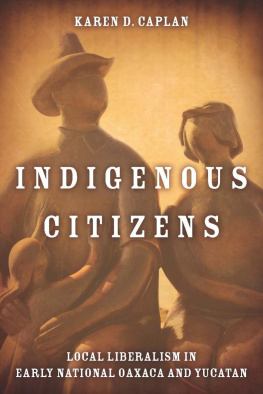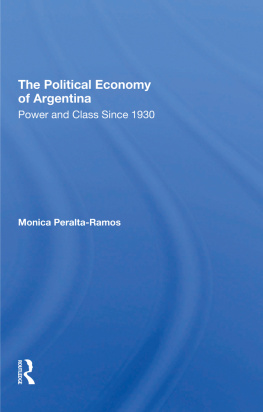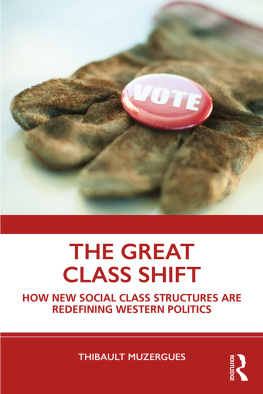Stanford University Press
Stanford, California
2013 by the Board of Trustees of the Leland Stanford Junior University.
All rights reserved.
No part of this book may be reproduced or transmitted in any form or by any means, electronic or mechanical, including photocopying and recording, or in any information storage or retrieval system without the prior written permission of Stanford University Press.
Printed in the United States of America on acid-free, archival-quality paper
Library of Congress Cataloging-in-Publication Data
Walker, Louise E., author.
Waking from the dream : Mexicos middle classes after 1968 / Louise E.Walker.
pages cm
Includes bibliographical references and index.
ISBN 978-0-8047-8151-0 (cloth) ISBN 978-0-8047-8457-3 (e-book)
1. Middle classPolitical activityMexicoHistory20th century.2. MexicoEconomic conditions19701982. 3. MexicoEconomic conditions19821994. 4. MexicoEconomic policy19701994. 5. MexicoPolitics and government19701988. I. Title.
HT690.M4W35 2013
305.5'509720904dc23
2012037022
Typeset by Bruce Lundquist in 10.5/12 Sabon
Acknowledgments
I began this book more than ten years ago, and many people and institutions have been a part of itsand mylife. My first thanks are to Gilbert Joseph. I am deeply grateful to Gil for his sharp insight, his generosity, and his sense of humor. Gil trained me to think critically about Mexican and Latin American history and helped me figure out how to become a historian on my own terms and in my own rhythm. Without him, I would not have survived in the academy for very long. I want to thank several other mentors who have encouraged me, and this project, in important ways. Stuart Schwartz helped me to think historically about the bigger picture and set an example by asking the sort of questions I aspire to ask. Michael Denning helped me to think creatively; I always left our conversations inspired, with a fresh perspective on whatever it was I was working on. Pablo Piccato helped me grapple with several methodological challenges, and his research suggestions sent me in unexpected and productive directions. I also want to thank Ariel Rodrguez Kuri, whose advice about research questions and archival sources shaped this project at several key moments. Catherine LeGrand sparked my interest in Latin American history and helped me get started on this path; I am forever thankful.
This book would not have been possible without the support of many institutions. In Mexico, the Centro de Estudios Demogrficos, Urbanos y Ambientales at the Colegio de Mxico generously provided a home for two years. Research and writing were funded by the Yale Graduate School, the Yale Center for International and Area Studies, the Fox Foundation at Yale University, the Mellon Foundation, the Ministry of Foreign Relations of Mexico, and the Social Science and Humanities Research Council of Canada, and by faculty research support from Louisiana State University, the New School for Social Research, and Northeastern University.
The on-the-ground help and humor of archivists and librarians made research not just productive but enjoyable. I am especially grateful to the archivists in Galleries One, Two, Three, and Six at the Archivo General de la Nacin, and to the librarians at the Miguel Lerdo de Tejada, Banco de Mxico, Biblioteca Nacional, and Colegio de Mxico libraries.
I have special debts to Alexander Avia, Ingrid Bleynat, and Tanals Padilla. Alex helped me to articulate the underlying arguments of this project. Tanals helped me to think through the methodological challenges of writing recent history. And Ingrid helped me to think more analytically and more historically and, in the broadest sense, to understand Mexican history. I have learned more from these three friends and interlocutors than I can ever express. Their incisive comments on countless drafts, while invisible to the reader, remain visible to me on every page.
Many people have generously read earlier versions of these chapters, and the book is much improved for their suggestions. I would like to thank Gustavo del ngel, Jeffrey Bortz, Christine Kooi, Luis Martn-Cabrera, Manuella Meyer, Daniel Noemi Voionmaa, Paul Paskoff, Anne Rubenstein, Tatiana Seijas, Kirsten Weld, and Eric Zolov for their thoughtful feedback on different chapters. I am especially indebted to Jrgen Buchenau, Lyman Johnson, and an anonymous reader for comments on a previously published version of . And all parts of this book have been improved by the advice of colleagues at innumerable conferences and presentations. Errors of fact and interpretation are, of course, my own.
Becoming a historian is a lonely endeavor, and it might have been intolerable without the many great friends that I have made along the way. Sobeeh, David, Claudia, Haralampos, and Mara: thank you for the world of Edgewood Avenue. Ryan, Manuella, Camilla, Tatiana, and Kirsten: I could not have asked for better friends on this journey. Luis and Daniel: I am glad I was pulled into the vortex. The organizers of the Graduate Student Employees Organization at Yale University, and especially Alison Bruey, taught me more about how power works than I have learned from any book. Roberto Fraus friendship, the warm and caring home of the Arceo Gmez family, and my friends in the archivesespecially Ingrid, Ryan, Raphael, and Amarahelped me survive the vagaries of research. As I began writing, I found a community, and great potlucks, with historians in the Toronto Latin American Research Group. And, throughout everything, I have relied on the support and good cheer of my family and friends in Ireland and Canada, especially Allison Black, Ruby and Enright Clarke, Margaret and Sidney Cooper, Rosemary and Mervyn Elder, and Michael Wheeler. I want to thank everyone for the fun, the inspiration, and the friendships.
My colleagues at Louisiana State University provided a welcoming home during my first years after graduate school. I am especially grateful to Maribel Dietz, Gaines Foster, Christine Kooi, Leonard Ray, and Victor Stater for their mentoring and friendship. I am also indebted to my colleagues in the Committee on Historical Studies at the New School for Social Research for their encouragement, bonhomie, and counsel, with special thanks to Federico Finchelstein, Oz Frankel, Jeremy Varon, and Eli Zaretsky. I am fortunate to have found another nurturing environment in the History Department at Northeastern University, and I want to thank Laura Frader, Tom Havens, and Uta Poiger for their support and enthusiasm.
I am deeply grateful to my editor, Norris Pope, for believing in this project and for guiding me through the process. Also at Stanford University Press, Emma Harper and Carolyn Brown patiently answered many questions, and Christine Gevers copyediting refined the style and content of the text. Two anonymous readers offered insightful feedback and cogent suggestions, which significantly improved the book. Camila Vergara and Marcelo Villagrn lvarez provided excellent research assistance. Constance Hale, wordsmith and shrewd reader, helped me sharpen the prose and structure.





